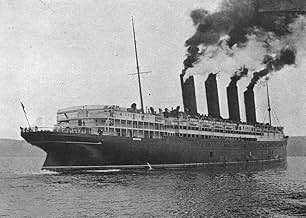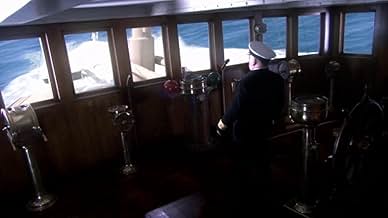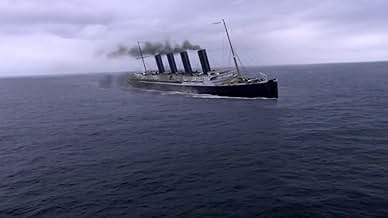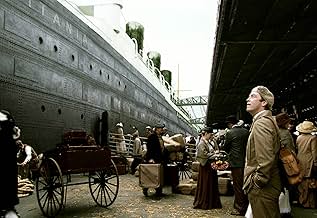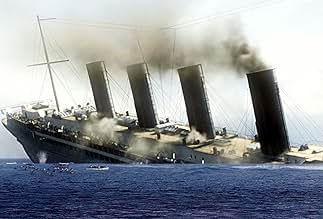A dramatization of the notorious World War I torpedoing of the ocean liner, RMS Lusitania.A dramatization of the notorious World War I torpedoing of the ocean liner, RMS Lusitania.A dramatization of the notorious World War I torpedoing of the ocean liner, RMS Lusitania.
- Director
- Writers
- Stars
Florian Panzner
- Lt. Capt. Schwieger
- (as Florian Panzer)
Madeleine Garrood
- Avis Dolphin
- (as Maddeleine Garrood)
Andre Weideman
- Johnston
- (as Andre Weiderman)
Stephen Jennings
- Carson
- (as Steven Jennings)
Robyn LeAnn Scott
- Peggy
- (as Robyn Scott)
- Director
- Writers
- All cast & crew
- Production, box office & more at IMDbPro
Featured reviews
The movie was okay and the cast did a wonderful job delivering the emotional impact the movie should have. What also worked was the actual footage at the end. What was horrible was depicting Winston Churchill and the British hierarchy as actually evil. That was unnecessary and pure nonsense.
Over a century ago, there was a time when warfare between nations was expected to be fought with some semblance of chivalry, and noncombatants were to be protected from harm.
Any semblance of that finally came to an end on 7 May, 1915.
Based on true events, this docudrama tells the story of one of the most pivotal events of the First World War, the sinking of the RMS Lusitania. This was the other British liner that went down tragically, but whose death could not have been more different. While not as lavish a production as the James Cameron movie, "Lusitania" nevertheless gives the viewer a reasonably accurate picture of the ship and its end. The performances are good, the story pretty much follows the historic record, and the special effects are convincing enough in depicting the death of the doomed liner. One of the movie's best scenes intersperses actual film footage of the Lusitania leaving New York on her final voyage, a sobering and haunting moment.
There's also an important backstory, namely the reason why the Lusitania was attacked in the first place. Both Lusitania and her sister Mauretania were listed as auxiliary cruisers in the Royal Navy registry. The ship was also loaded with munitions, in violation of international law. Through their agents in New York, the Germans were aware of this. There was also the fact that Winston Churchill, head of the Admiralty, wanted to create an incident at sea to bring America into the allied cause.
There are of course, some flaws in this production. For instance, the actor portraying Captain Turner in no way resembles the real person. The late Ian Holm would have been a better choice. However ,the main criticism of this motion picture is sometimes it gives the impression of being "Titanic" meets "Das Boot".
But when the torpedo strikes the hull and the contraband munitions explode, all similarities come to an end, and the mayhem that was the sinking is shown. People are drowned, pulled under, and meet other horrific ends. Unlike the Titanic, the band did not play on, the lovers did not unite, there was no nobility displayed by the passengers, and the Captain did not go down with the ship. This is where this film truly becomes the "Anti-Titanic". But even this cannot fully bring forth the nightmare that was the Lusitania. To make a comparison, the Titanic took two and a half hours to go under, while the Lusitania, a ship 90 percent the Titanic's size, went down in just 18 minutes. The percentage of loss of life was significantly higher, with 1200 souls lost out of 2000 aboard, including 120 Americans.
The international condemnation of Germany that followed this horrific loss of life was near unanimous. Like a prairie fire a wave of shock and indignation spread throughout America, and none other than former President Theodore Roosevelt declared the Lusitania's sinking to be a "barbarous act of piracy". President Woodrow Wilson however, decided to err on the side of caution. Nevertheless, the fuse was lit for America's eventual entry into World War I.
Any semblance of that finally came to an end on 7 May, 1915.
Based on true events, this docudrama tells the story of one of the most pivotal events of the First World War, the sinking of the RMS Lusitania. This was the other British liner that went down tragically, but whose death could not have been more different. While not as lavish a production as the James Cameron movie, "Lusitania" nevertheless gives the viewer a reasonably accurate picture of the ship and its end. The performances are good, the story pretty much follows the historic record, and the special effects are convincing enough in depicting the death of the doomed liner. One of the movie's best scenes intersperses actual film footage of the Lusitania leaving New York on her final voyage, a sobering and haunting moment.
There's also an important backstory, namely the reason why the Lusitania was attacked in the first place. Both Lusitania and her sister Mauretania were listed as auxiliary cruisers in the Royal Navy registry. The ship was also loaded with munitions, in violation of international law. Through their agents in New York, the Germans were aware of this. There was also the fact that Winston Churchill, head of the Admiralty, wanted to create an incident at sea to bring America into the allied cause.
There are of course, some flaws in this production. For instance, the actor portraying Captain Turner in no way resembles the real person. The late Ian Holm would have been a better choice. However ,the main criticism of this motion picture is sometimes it gives the impression of being "Titanic" meets "Das Boot".
But when the torpedo strikes the hull and the contraband munitions explode, all similarities come to an end, and the mayhem that was the sinking is shown. People are drowned, pulled under, and meet other horrific ends. Unlike the Titanic, the band did not play on, the lovers did not unite, there was no nobility displayed by the passengers, and the Captain did not go down with the ship. This is where this film truly becomes the "Anti-Titanic". But even this cannot fully bring forth the nightmare that was the Lusitania. To make a comparison, the Titanic took two and a half hours to go under, while the Lusitania, a ship 90 percent the Titanic's size, went down in just 18 minutes. The percentage of loss of life was significantly higher, with 1200 souls lost out of 2000 aboard, including 120 Americans.
The international condemnation of Germany that followed this horrific loss of life was near unanimous. Like a prairie fire a wave of shock and indignation spread throughout America, and none other than former President Theodore Roosevelt declared the Lusitania's sinking to be a "barbarous act of piracy". President Woodrow Wilson however, decided to err on the side of caution. Nevertheless, the fuse was lit for America's eventual entry into World War I.
People always talk about Titanic this Titanic that, it was an accident waiting to happen. People died yes on that ship where it could have been averted. The Lusitania however, was the beginning and the end for the Germans and eventually lose World War One. The sinking of the ship was a barbaric act and no doubt a sad ending for those who died. Unlike the Titanic where there wasn't enough lifeboats, Lusitania had all the safety feature that was built into after Titanic like double hull and more then enough lifeboat for the passenger, but wasn't build to stop a torpedo.
The movie itself was really good. I'm surprise that guy from Mummy was in the movie and instead of being a comic relief, gave a very serious acting in the movie where he was a victim on the ship. The other people in the movie also showed the same and for a quality we expected in a docu-drama movie, the movie more the met my expectation. The sinking was very well done and was more sad then Titanic. Thank goodness there is none of this Jack and Rose crap in it.
Otherwise, a very well made movie and one that should be a reminder about how Lusitania became a pawn in the World War.
The movie itself was really good. I'm surprise that guy from Mummy was in the movie and instead of being a comic relief, gave a very serious acting in the movie where he was a victim on the ship. The other people in the movie also showed the same and for a quality we expected in a docu-drama movie, the movie more the met my expectation. The sinking was very well done and was more sad then Titanic. Thank goodness there is none of this Jack and Rose crap in it.
Otherwise, a very well made movie and one that should be a reminder about how Lusitania became a pawn in the World War.
If you want the best info on it read the book Dead Wake. excellent in the details. makes you think you where on it with the detail info on passengers. used the war diary from the german sub commander and he reviewed the books and pics from the sinking. he obtained some very recent info from the British secret service who knew where the sub was but didint tell the ship. a sad bunch of unfortunate circumstances.
Movies about the Titanic have come and gone and many such movies, from blockbuster epics to cheap low budget movies (some were so low budgeted that the camera crews tilted their cameras instead of tilting the set!) have made their way from the movie theater and the TV, to video and later to DVD.
Yet little has been said about the Lusitania, whose sinking opened a lot of potential.
The story behind the Titanic can be summed up as follows:
Ship sets sail on its maiden voyage.
Ship hits an iceberg.
Ship sinks in the mid Atlantic.
Casualties mount.
A few survive.
End of the story.
But the Lusitania had a story far more complex. Were they bringing arms to England? Were passengers warned? Were dispatches sent to the Captain? Was the Captain innocent? Or was he guilty? These are complex questions with no real simple answers.
The movie was very well done and sure, some facts were distorted. It was war. And every historian knows that the first casualty in a war is the Truth.
Unlike TITANIC (1998), the central characters in this feature were not fictitious. They really did exist. Prof. Ian Holbourn (born November 5, 1872 and died September 15, 1935) was a passenger on the Lusitania. And he really befriended a young girl named Avis Dolphin (born 1903? and died February 5,1996).
And that "good German" on the U-boat that sank the Lusitania was not a fictitious character added to keep things politically correct, either. He also existed. Quartermaster Charles Vogele allegedly refused to relay the order to fire the torpedo and he was tried and courts-marshaled, and spend 3 years in prison for his crime. (Some accounts claimed that Voegele was an electrician, not a Quartermaster.)
It was no secret that Captain Turner later admitted that had the roles been reversed, he wouldn't had behaved any differently than Lt. Capt. Schwieger, who gave the order to fire that torpedo.
I rate this movie an 9 out of 10.
Yet little has been said about the Lusitania, whose sinking opened a lot of potential.
The story behind the Titanic can be summed up as follows:
Ship sets sail on its maiden voyage.
Ship hits an iceberg.
Ship sinks in the mid Atlantic.
Casualties mount.
A few survive.
End of the story.
But the Lusitania had a story far more complex. Were they bringing arms to England? Were passengers warned? Were dispatches sent to the Captain? Was the Captain innocent? Or was he guilty? These are complex questions with no real simple answers.
The movie was very well done and sure, some facts were distorted. It was war. And every historian knows that the first casualty in a war is the Truth.
Unlike TITANIC (1998), the central characters in this feature were not fictitious. They really did exist. Prof. Ian Holbourn (born November 5, 1872 and died September 15, 1935) was a passenger on the Lusitania. And he really befriended a young girl named Avis Dolphin (born 1903? and died February 5,1996).
And that "good German" on the U-boat that sank the Lusitania was not a fictitious character added to keep things politically correct, either. He also existed. Quartermaster Charles Vogele allegedly refused to relay the order to fire the torpedo and he was tried and courts-marshaled, and spend 3 years in prison for his crime. (Some accounts claimed that Voegele was an electrician, not a Quartermaster.)
It was no secret that Captain Turner later admitted that had the roles been reversed, he wouldn't had behaved any differently than Lt. Capt. Schwieger, who gave the order to fire that torpedo.
I rate this movie an 9 out of 10.
Did you know
- TriviaThe U-20 set was the original U-96 set used in Le Bateau (1981). The Type U-19 of World War I and Type VIIC of World War II had similar internal dimensions. The Lusitania scenes were filmed with full-scale sections of the ship off the coast of South Africa while the U-20 scenes were filmed at Bavaria Studios in Munich using the then-newly refurbished 25-year-old U-boat set, studio model and full-size prop originally built for the West German war film Das Boot (1981).
- GoofsOn at least two occasions the captain of the U 20 gives the order to "blow ballast" when he wants to dive the submarine. This order would result in all water being blown out of the ballast tanks and should only be given to surface the boat. In order to dive a submarine one must flood the ballast tanks with water.
- Quotes
Captain Turner: They're not interested in the truth.
- Crazy creditsAdrian Topol's character name is pronounced Voegele in the German dialogue and is spelled this way in the accompanying English subtitles. However in the credits it is spelled Vogele. Correct German spelling uses either "ö" (o with an umlaut) or else "oe".
- ConnectionsFeatured in Titanic al detalle (2013)
Details
- Release date
- Countries of origin
- Languages
- Also known as
- Sinking of the Lusitania: Terror at Sea
- Production companies
- See more company credits at IMDbPro
Contribute to this page
Suggest an edit or add missing content

